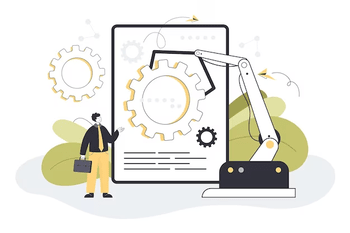As the age of technological advancement accelerates, AI and supply chain management have become a dynamic that is very essential in disrupting the base of contemporary commerce.
This detailed manual explores how AI Supply Chain Management Automation is revolutionizing the landscape, where the data meets logistics to create a paradigm shift for operational performance.
Statistics show the scale of this particular paradigm change.
As per a recent industry report, the companies incorporating AI in their supply chain activities attain an average reduction of 15% operational costs and gain an astounding 17 % efficiency increase.
Throughout this guide, we reveal the intertwining layers of AI’s effect on the supply chain processes and determine tangible advantages that emerge from the union of technology and logistics.
Table of Contents
Understanding Supply Chain Automation:
Supply chain automation refers to the utilization of many different technologies in order to streamline and improve the product flow, information, and also financial processes from end-to-end. AI significantly contributes to these processes by using sophisticated algorithms and machine learning.
Key Components of AI Supply Chain Automation:
- Predictive Analytics:
Using historical information to predict the demand.
Improving the decision-making processes used in the inventory management.
- Demand Forecasting with AI:
Machine learning algorithms detect many patterns and trends.
Precise demand forecasting reduces the inventory and also stockouts.
- Warehouse Automation:
AI-enabled robotics for efficient inventory control can be used to streamline the process.
Order picking and packing automation.
- Route Optimization:
AI algorithms are used to optimize the delivery routes in a cost-effective manner.
Changes in real time depending on the traffic and also weather.
- Supplier Relationship Management (SRM) with AI:
AI solutions for assessing and controlling the supplier relationships.
Performance analytics to identify the best suppliers.
- Quality Control Automation:
AI-based systems for live quality control are very advanced.
Defect detection and correction during the manufacturing process is very important.
- Supply Chain Visibility Platforms:
AI integration for end-to-end visibility.
Inventory and shipment tracking in real time throughout the supply chain.
- AI-Enhanced Risk Management:
Predictive analytics for identifying the potential risks in the supply chain.
Real-time data analytics-based automated risk mitigation strategies.
Benefits of AI Supply Chain Automation:
Here are some of the benefits that you can experience with AI supply chain management automation program:
- Improved Efficiency:
Accelerated processes reduce lead times.
The reduction of manual errors in activities like order processing.
- Cost Reduction:
Optimization results in lower operational costs.
Carrying costs are often reduced through effective inventory management.
- Enhanced Visibility:
Real-time tracking ensures visibility of goods in transit.
Promotes transparency throughout the supply chain.
- Risk Mitigation:
Early identification of potential disruptions.
Dynamic risk assessment and mitigation strategies
- Enhanced Collaboration and Communication:
AI makes the communication between supply chain participants very easy.
AI-powered collaborative platforms ensure the very effective sharing of information.
- Personalized Customer Experiences:
With the help of AI, the data-driven insights for customer preferences are achieved.
Product recommendations and delivery options personalized for the customer can increase the satisfaction.
- Adaptability to Market Trends:
AI algorithms study the market trends and also consumer behavior.
Rapid adjustment to the evolving market needs, providing continuous viability.
- Human Resource Optimization:
Routine work automation enables the human resources to concentrate on the strategic actions.
Job satisfaction and better workforce productivity due to the decreased amount of manual labor.
Applications Across Industries:
- Retail:
Fluctuating demand inventory optimization.
Faster order fulfillment to improve the customer satisfaction and experience.
Better demand forecasting to the perfect stock levels.
- Manufacturing:
Predictive maintenance strategies that will help to minimize the downtime.
Automation of the production processes for a greater efficiency.
Cost effective resource utilization through just-in-time manufacturing.
- Logistics:
Timely and very cost-efficient delivery route optimization.
The tracking and monitoring of the shipments is done in real-time.
The adoption of RFID technology to enhance the inventory visibility.
Predictive analytics for proactive issue management is very important.
- Healthcare:
Medical supplies inventory optimization to ensure quick availability.
Improved patient care through effective supply chain management.
Real-time monitoring of the medical equipment with the help of IoT devices.
Simplified procurement process for efficient healthcare operations.
Challenges In AI Supply Chain Automation:
- Integration Complexity:
Integrating AI with the current systems is very important.
The need for professionals to lead the transition is very important.
- Data Security Concerns:
Security of the vulnerable supply chain data.
Implementing robust cybersecurity measures.
- Cost of Implementation:
First, investments on AI technology and training.
Measuring the long-term ROI.
The Future of AI Supply Chain Automation:
- Advancements in AI Technology:
Further development of the machine learning algorithms.
The fusion of AI with other novel technologies such as the blockchain.
- Global Adoption:
Increased awareness and the uptake across the sectors.
Wider adaptability into the smaller firms and into supply chain networks.
- Sustainability Initiatives:
Eco-friendly supply chain practices are based on AI optimization.
Carbon footprint reduction through the use of intelligent logistics planning.
The Final Takeaway
In the midst of this technologically advanced business landscape, the AI Supply Chain Management Automation shines as epitomizing efficiency and also innovativeness.
By accepting this technology, businesses can respond much better, be more competitive in the marketplace and also create a dynamic supply chain that adapts to any change.

